Tenant Power Toolkit
The Tenant Power Toolkit prevents homelessness by helping low-income tenants to stay housed. The online Toolkit informs tenants of their rights, and connects them with an eviction-defense attorney - free of charge - so that they can fight eviction.

Please list the organizations collaborating on this proposal.
The Debt Collective
What is the primary issue area that your application will impact?
Housing and Homelessness
In which areas of Los Angeles will you be directly working?
County of Los Angeles
In what stage of innovation is this project, program, or initiative?
Pilot or new project, program, or initiative
What is your understanding of the issue that you are seeking to address?
LA County is experiencing a housing and homelessness crisis. In the LA Metro Area alone, there are an estimated 647,000 tenants at-risk of being unable to pay rent. More than 80% are BIPOC. LAHSA estimates that each day some 207 people exit homelessness—but 227 others take their place. Prior to the pandemic, LA County landlords filed more than 40,000 eviction or Unlawful Detainer (UD) cases annually. This is expected to increase now that eviction protections are gone. It’s estimated tenants lose by default in 40% of cases—meaning that tenants did not file a response within five days. According UCLA’s Luskin Institute on Inequality and Democracy, “only a small proportion of tenants in eviction cases are represented by lawyers, compared to 95% of landlords.” Prevention is best way to end homelessness. Providing tenants with the tools to fight eviction is crucial to helping low-income Angelenos maintain housing and avoid homelessness.
Describe the project, program, or initiative this grant will support to address the issue.
The Tenant Power Toolkit is a collaborative project between Inner City Law Center and the Debt Collective that will prevent homelessness by helping low-income tenants stay housed. The online Toolkit informs tenants of their rights, and connects them with an eviction-defense attorney - free of charge - so that they can fight eviction The project involves three components: 1. Creation, operation, and maintenance of the Tenant Power Toolkit, a web-based platform that allows tenants to file responses to eviction notices. The tool prepares not only an Answer (a defendant’s response to a legal filing) but also the paperwork necessary to obtain a Waiver of Court Fees, a Declaration of COVID-related Financial Distress, and (when appropriate) a Demand for Jury Trial. The tool electronically serves and files these legal documents. 2. An outreach and education campaign about tenants’ rights and the availability of this tool conducted through media, phone calls, texting, canvassing, community and collaborative partner meetings, and government partnerships. 3. Free, full scope representation in LA County courts. According to a 2019 STOUT study, 95% of people facing eviction who have full scope representation have a “high likelihood of avoiding disruptive displacement.” Simply put, evidence shows that full-scope legal representation is the most effective way for a tenant to avoid eviction and possible homelessness.
Describe how Los Angeles County will be different if your work is successful.
This project will reduce homelessness by giving poor and low-income tenants the ability to fight illegal and wrongful evictions, and avoid losing their housing. It is shockingly common for ICLC to see clients subjected to harassment and illegal eviction attempts by landlords who want tenants out so they can increase rents. Countless more don’t reach us in time. The project will serve vulnerable, low-income people who would otherwise lack legal representation and the ability to file a response within the required five business days. Our project will help tenants avoid homelessness by informing them of their rights, providing them with a way to respond to eviction notices quickly, and connecting them to legal help they would otherwise not be able to afford. Short term, we will help low-income Angelenos at risk of eviction stay housed. Long term, the Tenant Power Toolkit will serve all counties in California, and will help to reduce homelessness throughout the state.
What evidence do you have that this project, program, or initiative is or will be successful, and how will you define and measure success?
Each step of the project has built-in evaluation measures. The digital nature of the tool will allow the Debt Collective to receive extensive data about how tenants are interacting with the tool. We will regularly convene meetings that involve all team members to discuss evaluation data from the toolkit, outreach efforts, caseloads, and case outcomes. We will adjust the project as needed to ensure that quality is maintained and the project reaches its intended goals. We will receive and share feedback from our many community partners about the tool, including how the Toolkit can be made more accessible and more effective. ICLC eviction-defense attorneys who take on these cases will provide invaluable feedback about how the Toolkit is functioning. The successful submission of a UD answer will be deemed effective if it allows a tenant to stay in their housing long enough to link with a lawyer and local tenant organizations.
Approximately how many people will be impacted by this project, program, or initiative?
Direct Impact: 500
Indirect Impact: 1,500
Describe the specific role of the partner organization(s) in the project, program, or initiative.
ICLC and the Debt Collective will focus on building and supporting the online tool. The Debt Collective will focus on the technical construction of the tool. ICLC will provide the legal expertise to shape the tool. Both will use their existing collaborative networks, media contacts, and outreach teams to promote use of the online tool in our prospective regions. ICLC’s Tent Defense Project team will provide full scope representation to tents who use the Toolkit in Los Angeles County. All partners will use volunteer assistance in outreach efforts as needed, and ICLC will tap its dedicated pool of pro bono attorneys to represent clients and support the Tent Defense Project team. Gary Blasi and Hanh Appel will continue to generously dote their time and services to the project.